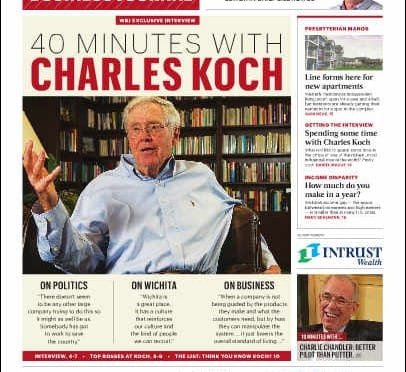Category: Wichita news media
-

Wichita Business Journal remodels, features Charles Koch interview
The Wichita Business Journal has relaunched and starts its new life with features on Koch Industries and an extended interview with Charles Koch.
-
What is the import of the farm bill to Kansas?
Correcting the Wichita Eagle’s facts will place the importance of the farm bill to Kansas in proper perspective.
-
Fired KAKE reporter on Joseph Ashby Show
Today former KAKE Television news reporter Jared Cerullo appeared on the Joseph Ashby Show.
-
Joseph Ashby on local news media, anti-conservative bias
On the Joseph Ashby Show, the host commented on Wichita news media, and drew some conclusions about anti-conservative bias in Wichita news media.
-
Wichita Eagle quality control could use improvement
When presented with evidence of errors in its stories, the Wichita Eagle, Kansas’ largest newspaper, is not being responsive in correcting its errors.
-
Wichita Eagle editorial endorsements: helpful, or not?
Yesterday’s primary election in Kansas provided a measure of the influence of the Wichita Eagle editorial board. Voters ignored many of its endorsements, indicating that the newspaper — its editorial side, at least — is increasingly out of touch with its readers.
-
Wichita Eagle endorsements deserve scrutiny
The Wichita Eagle editorial board has made its endorsements for offices in the August 3rd Kansas primary election. Before voters decide whether to rely on these recommendations, they deserve some examination.
-
Correction
In my article Wichita city hall silent on handling of ethics issue, I made a mistake in stating that a ready-to-print story was canceled by Wichita Eagle newsroom management. Eagle editor Sherry Chisenhall informs me that the newspaper did perform research as I reported, but the matter never advanced to a story that was ready…
-
KSN news director meets with critics
On Saturday October 17, 2009, about 50 Wichitans met in front of Wichita’s KSN Television studio to express their concerns about the state of news media. The event was part of a national protest named “Can you hear us now?” Locally, the South Central Kansas 9.12 Group promoted the event. Jason Kravarik, KSN News Director…
-
It’s a slow, slow news day
Is there no substantive news to cover in Wichita? One of the top stores in the headline rotation at KAKE TV’s website has the headline “Girls Burned By Hot Coffee.”
-
Wichita Eagle reporter to speak to Pachyderms
This Friday, Wichita Eagle investigative and special reporter Dion Lefler will speak to the Wichita Pachyderm Club.
-
Former Wichita Eagle editor addresses journalism, democracy
On Friday, former Wichita Eagle editor W. Davis “Buzz” Merritt Jr. spoke to members and guests of the Wichita Pachyderm Club. He retired as editor of the Eagle in 1999. He is the author of the book Knightfall: Knight Ridder and How the Erosion of Newspaper Journalism Is Putting Democracy at Risk. Merritt said there…